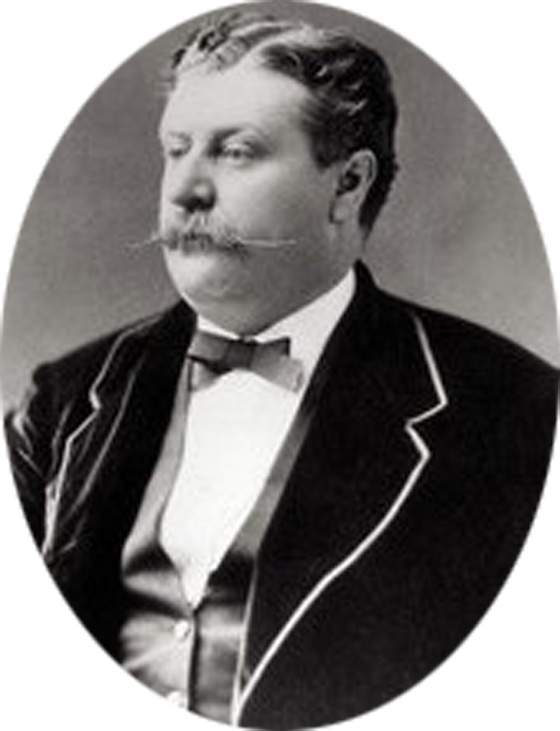|
Business Magnates, Industrialists, Railroad Tycoons, Capitalists, Financiers
|
|
James Fisk Jr.
|
 |
| James Fisk, u.a. genannt als "Big Jim" (1835-1872), war ein US-amerikanischer Unternehmer und Spekulant.
Nach einer kurzen Schullaufbahn schloss sich Fisk einem Zirkus an, wurde später Hotelkellner und ging wie sein Vater hausieren. Schließlich nahm er eine Stelle als Verkäufer bei einer Bostoner Textilfirma an. Seine Begabung und sein Fleiß brachten ihm bald einen Anteil am Geschäft ein. Dadurch, und mit dem Schmuggel von Baumwolle, den er während des Bürgerkrieges betrieb, gelangte Fisk zu ansehnlichem Reichtum. Doch seine Spekulationen brachten ihn bald um sein Vermögen. 1864 wurde Fisk Börsenmakler in New York und Partner von Daniel Drew, dem er im Kampf gegen Cornelius Vanderbilt half. Durch Drew kam er gemeinsam mit Jay Gould in den Vorstand der Erie Railroad. Gemeinsam mit Gould trickste er wenig später seinen Partner Drew aus und erlangte so die Kontrolle über die Erie Railroad. Fisk und Gould betrieben Börsen-Freibeuterei, Bestechung von hohen Politikern (wie Boss Tweed) und Gerichten. Ihr Versuch, den Goldmarkt aufzukaufen, wurde jedoch 1869 vom fatalen Schwarzen Freitag vereitelt. Ein Streit mit Edward S. Stokes um Geld und das Broadway-Showgirl Josie Mansfield endete tragisch. Stokes erschoss Big Jim Fisk am 6. Januar 1872 in New York. |
| James Fisk, Jr. (1835-1872), known variously as "Big Jim," "Diamond Jim," and "Jubilee Jim," was an American stock broker and corporate executive.
Fisk was born in the hamlet of Pownal, Vermont in the township of Bennington on April Fool's Day. After a brief period in school, he ran away in 1850 and joined Van Amberg's Mammoth Circus & Menagerie. Later, he became a hotel waiter, and finally adopted the business of his father, a peddler. He applied what he learned in the circus to his peddling and grew his father's business. He then became a salesman for Jordan Marsh, a Boston dry goods firm. A failure as a salesman, he was sent to Washington, D.C., in 1861 to sell textiles to the government. By his shrewd dealing in army contracts during the Civil War, and, by some accounts, cotton smuggling across enemy lines (in which he enlisted the help of his father), he accumulated considerable wealth, which he soon lost in speculation. In 1864 he became a stock broker in New York and was employed by Daniel Drew as a buyer. He aided Drew in the Erie War against Cornelius Vanderbilt for control of the Erie Railroad. This resulted in Fisk and Jay Gould becoming members of the Erie directorate, and subsequently, a well-planned raid netted Fisk and Gould control of the railroad. The association with Gould continued until Fisk's death. Fisk and Gould carried financial buccaneering to extremes: their program included an open alliance with Boss Tweed, the wholesale bribery of legislatures, and the buying of judges. Their attempt to corner the gold market culminated in the fateful Black Friday of September 24, 1869. Fisk married Lucy Moore in 1854; he was 19, she 15. Lucy was an orphan, reared by an uncle, from Springfield, Massachusetts. She tolerated Fisk's many extramarital affairs and lived with a woman friend, suggesting the possibility that she was a lesbian. Regardless, they remained close, with Fisk visiting her in Boston every few weeks and spending summers and vacations with her. In New York, Fisk had a relationship with Josie Mansfield, a show-girl. Fisk housed Josie in an apartment a few doors down from the Erie Railroad headquarters on West 23rd Street and had a covered passage built linking the backdoors of the headquarters and her apartment building. Fisk's relationship with Mansfield scandalized New York society. Mansfield eventually fell in love with Fisk's business associate Edward S. Stokes (1840–1901), a man noted for his good looks. Stokes left his wife and family for Mansfield and Mansfield left Fisk. In a bid for money, Mansfield and Stokes tried to extort money from Fisk by threatening the publication of letters written by Fisk to Mansfield that allegedly proved Fisk's legal wrongdoings. A legal and public relations battle followed, but Fisk refused to pay Mansfield anything. Increasingly frustrated and flirting with bankruptcy, Stokes shot and killed Fisk in New York city on January 6, 1872. Fisk gave a dying declaration identifying Stokes as the killer, and Stokes served four years of a six year prison sentence for manslaughter. |